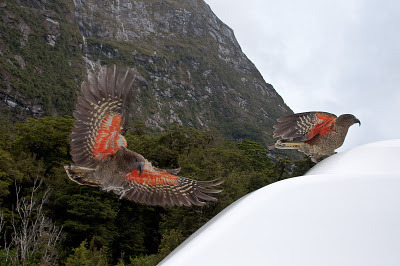Vultures Take Cattle
 (Dellex/Creative Commons)
(Dellex/Creative Commons)Yet another unexpected effect of exterminating wildlife: From Spain comes the news that vultures are taking cattle. The vultures are no match for healthy adult cattle, but they take calves and, in the case reported in the news story linked below, a cow weakened by giving birth.
Scientists are attributing this behavior to the lack of easier meals--the dead animals, wild and domestic, the vultures would prefer. My correspondent Croconut, who alerted me to this story, tells me the vultures are protected, but there's been some success setting up feeding spots for them so they won't attack livestock.
Like the predatory kea parrots of New Zealand, the vultures simply begin to eat the livestock alive. The keas are known to take flesh from the vulnerable backs of sheep. The sheep often survive the attack, only to die of infection later.
 Keas (klaasmer/Creative Commons)
Keas (klaasmer/Creative Commons)The news story doesn't say which species of vulture is involved. I suspect it's the large and abundant griffon vulture, which can weigh over 15 pounds. Much rarer, and thus probably not the culprit here, is the cinereous vulture (pictured), by some accounts the largest bird of prey in the world. It can reach twice that weight, and its wings can span ten feet.
The article is in Spanish. English-speaking readers may get a hoot, but probably not much information, from Google's bizarre translation of it; I provide a sample below.
The vultures are finished with a cow and a newborn calf Pascualcobo. elnortedecastilla.es: "The vulture, scavenger, has no ability to directly kill cattle, unlike the wolf," he said from the agricultural organization, stressing that the fresh cow, unable to lift, "it was easy to start devour, peck peck on the back, in soft, just whence the calf. "
Thus, the cow had eaten the back "no kill", thus "great suffering" for the animal, while the calf started eating the eyes and the soft parts, "until the animal died of suffering and bled."
Published on December 29, 2011 09:00
No comments have been added yet.



